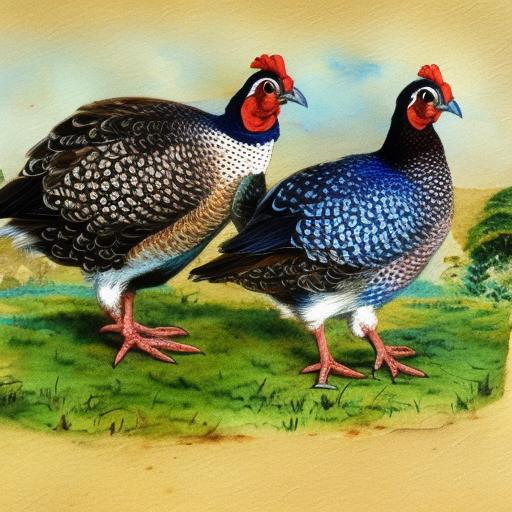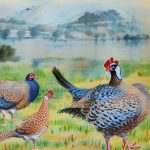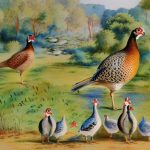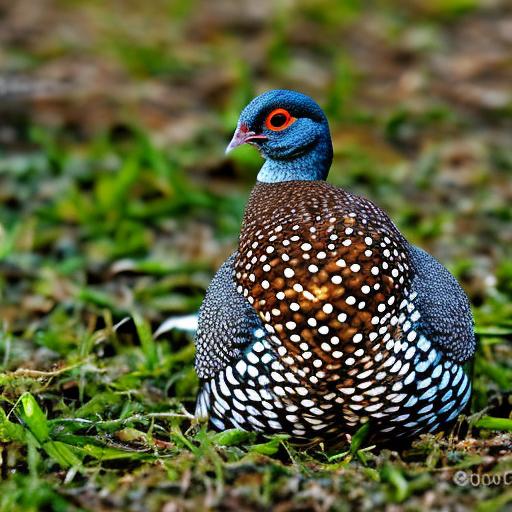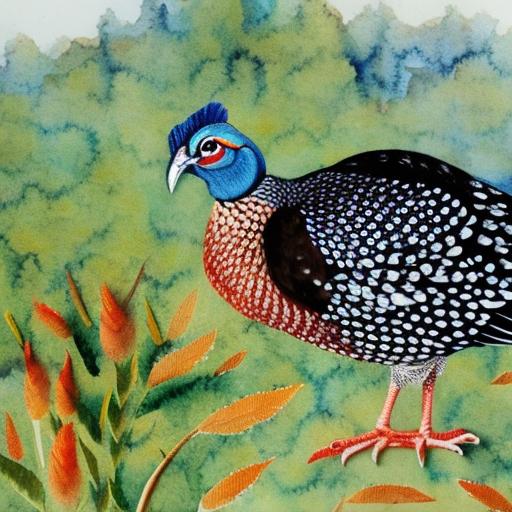Guinea fowl breeding is a rewarding and enjoyable endeavor for many poultry enthusiasts. These unique birds are known for their striking appearance, loud calls, and excellent foraging abilities. They are also valued for their delicious, lean meat and their ability to control pests in the garden. Breeding guinea fowl can be a fulfilling experience, whether you are a small-scale hobbyist or a commercial farmer.
Guinea fowl are hardy birds that are relatively low-maintenance, making them an attractive option for those looking to raise poultry. They are also known for their strong maternal instincts and can be excellent parents to their chicks. Breeding guinea fowl can be a profitable venture, as there is a growing demand for their meat and eggs in the market. However, successful breeding requires careful planning, proper management, and attention to the specific needs of these birds. In this article, we will explore the key aspects of guinea fowl breeding, from choosing the right breeding stock to caring for guinea fowl chicks, and provide valuable tips for a successful breeding operation.
Key Takeaways
- Guinea fowl breeding is a rewarding venture that requires careful consideration and planning.
- Choosing the right breeding stock is crucial for successful guinea fowl breeding.
- The breeding season for guinea fowl typically occurs in the spring and summer months.
- Proper nesting and egg laying conditions are essential for successful guinea fowl breeding.
- Incubation and hatching require careful monitoring and attention to ensure healthy chicks.
Choosing the Right Breeding Stock
Selecting the right breeding stock is crucial for successful guinea fowl breeding. When choosing breeding birds, it is important to select healthy, vigorous individuals with good conformation and strong genetic traits. Look for birds that are active, alert, and free from any signs of illness or deformities. It is also important to consider the age of the birds, as younger birds are generally more fertile and productive than older ones.
In addition to physical traits, it is important to consider the temperament and behavior of the birds. Guinea fowl can be quite territorial and aggressive, so it is important to select birds that are not overly aggressive towards each other. It is also advisable to choose birds from different bloodlines to avoid inbreeding and maintain genetic diversity within the flock. Finally, consider the purpose of your breeding program – whether it is for meat production, egg production, or pest control – and select birds that are best suited for your specific goals. By carefully selecting the right breeding stock, you can lay a strong foundation for a successful guinea fowl breeding program.
The Breeding Season
Guinea fowl are seasonal breeders, with the breeding season typically occurring in the spring and early summer. As the days begin to lengthen and the weather warms up, guinea fowl become more active and start to exhibit mating behaviors. During this time, male guinea fowl will display their vibrant plumage and engage in elaborate courtship displays to attract females. It is important to provide a suitable environment for breeding during this time, with ample space for the birds to engage in their natural mating behaviors.
It is also important to provide a balanced diet during the breeding season to ensure that the birds are in optimal condition for breeding. A diet rich in protein and essential nutrients will help to support reproductive health and fertility in both male and female guinea fowl. Additionally, providing access to fresh water and a clean, comfortable living environment will help to create ideal conditions for successful breeding. By understanding the natural breeding season of guinea fowl and providing the necessary resources, you can encourage healthy mating behaviors and maximize breeding success in your flock.
Nesting and Egg Laying
During the breeding season, female guinea fowl will begin to seek out suitable nesting sites to lay their eggs. Guinea fowl are known for their strong nesting instincts and will often choose secluded spots such as dense vegetation or brush piles to build their nests. It is important to provide suitable nesting materials such as straw or hay to encourage nesting behavior and provide a comfortable environment for egg laying.
Once a female has chosen a nesting site, she will lay a clutch of eggs over a period of several days, typically laying one egg per day. Guinea fowl eggs are small and speckled with a hard shell, and each female can lay anywhere from 30 to 40 eggs in a season. It is important to collect the eggs regularly to prevent them from being damaged or eaten by predators. Providing clean, well-ventilated nesting boxes can help to protect the eggs and encourage successful hatching.
It is also important to monitor the nesting behavior of the females and provide them with privacy and security during this time. Disturbances or stress can cause females to abandon their nests or stop laying eggs, so it is important to minimize disruptions and provide a calm, quiet environment for the nesting birds. By understanding the nesting and egg-laying behaviors of guinea fowl and providing appropriate nesting materials and management practices, you can support successful egg production in your flock.
Incubation and Hatching
After a female guinea fowl has completed her clutch of eggs, she will begin the process of incubating them to encourage hatching. Guinea fowl are known for their strong maternal instincts and will diligently incubate their eggs for approximately 26-28 days until they hatch. During this time, it is important to provide a secure and comfortable environment for the nesting female, as disturbances or stress can cause her to abandon the nest.
If you are interested in hatching guinea fowl eggs artificially, you can use an incubator to mimic the natural incubation process. Guinea fowl eggs require specific temperature and humidity levels for successful incubation, so it is important to carefully monitor these conditions throughout the incubation period. Turning the eggs regularly and maintaining proper ventilation are also essential for successful hatching.
Once the eggs begin to hatch, it is important to provide a warm, safe environment for the newly hatched chicks. Guinea fowl chicks are precocial, meaning they are born with their eyes open and are able to walk and feed themselves shortly after hatching. However, they still require protection from predators and access to food and water to thrive. By understanding the incubation and hatching process of guinea fowl eggs and providing appropriate care for the newly hatched chicks, you can support successful hatching and early chick development in your flock.
Caring for Guinea Fowl Chicks

Caring for guinea fowl chicks requires careful attention to their specific needs during the early stages of development. Providing a warm, draft-free brooding area with access to heat lamps or brooder heaters is essential for keeping the chicks comfortable and healthy. It is also important to provide access to clean water and a balanced chick starter feed that is high in protein and essential nutrients.
Guinea fowl chicks are active and curious by nature, so it is important to provide them with plenty of space to explore and exercise. However, it is also important to protect them from predators and provide a secure living environment during this vulnerable stage of development. Regularly monitoring the health and behavior of the chicks can help to identify any potential issues early on and provide appropriate care as needed.
As the chicks grow, it is important to gradually introduce them to outdoor living spaces and provide opportunities for them to forage and explore their surroundings. Guinea fowl chicks are natural foragers and will eagerly consume insects, seeds, and other small prey as they develop. By providing a balanced diet, appropriate living conditions, and attentive care, you can support healthy growth and development in your guinea fowl chicks.
Tips for Successful Guinea Fowl Breeding
1. Provide a balanced diet: Guinea fowl require a diet rich in protein and essential nutrients to support reproductive health and fertility during the breeding season.
2. Create suitable nesting sites: Providing secluded nesting areas with appropriate nesting materials can encourage successful egg laying and incubation.
3. Minimize disturbances: Creating a calm, quiet environment for nesting birds can help to reduce stress and encourage successful breeding behaviors.
4. Monitor egg production: Regularly collecting eggs and monitoring nesting behavior can help to protect eggs from predators and support successful hatching.
5. Provide appropriate care for chicks: Creating a warm, secure brooding area and providing access to balanced chick starter feed can support healthy chick development.
6. Protect from predators: Guinea fowl chicks are vulnerable to predators, so it is important to provide secure living environments during early development.
7. Monitor health and behavior: Regularly observing the health and behavior of breeding stock and chicks can help to identify any issues early on and provide appropriate care as needed.
By following these tips and understanding the specific needs of guinea fowl during the breeding process, you can support successful breeding outcomes in your flock. Whether you are interested in raising guinea fowl for meat production, egg production, or pest control, careful management practices and attentive care can help you achieve success in your guinea fowl breeding endeavors.
If you’re interested in learning more about the breeding cycle of guinea fowl, you may also find our article on creating the perfect chicken coop nest box to be helpful. Understanding the nesting habits and requirements of poultry can provide valuable insights into optimizing the breeding environment for guinea fowl. Check out our article on creating the perfect chicken coop nest box to enhance your knowledge of poultry breeding and care.
FAQs
What is the breeding cycle of guinea fowl?
Guinea fowl typically breed in the spring and early summer months. The breeding cycle includes courtship displays, mating, and egg laying.
How long does it take for guinea fowl eggs to hatch?
Guinea fowl eggs typically take about 26-28 days to hatch. The incubation period may vary slightly depending on environmental conditions.
How many eggs does a guinea fowl lay in a clutch?
A guinea fowl hen can lay anywhere from 20-30 eggs in a single clutch. They are known to be prolific layers.
What is the role of the male guinea fowl in the breeding cycle?
The male guinea fowl, also known as a “guinea cock,” plays a crucial role in the breeding cycle by engaging in courtship displays, mating with the hens, and protecting the nesting area.
At what age do guinea fowl reach sexual maturity?
Guinea fowl typically reach sexual maturity at around 6-8 months of age. This is when they are ready to participate in the breeding cycle.
Meet Walter, the feathered-friend fanatic of Florida! Nestled in the sunshine state, Walter struts through life with his feathered companions, clucking his way to happiness. With a coop that’s fancier than a five-star hotel, he’s the Don Juan of the chicken world. When he’s not teaching his hens to do the cha-cha, you’ll find him in a heated debate with his prized rooster, Sir Clucks-a-Lot. Walter’s poultry passion is no yolk; he’s the sunny-side-up guy you never knew you needed in your flock of friends!

